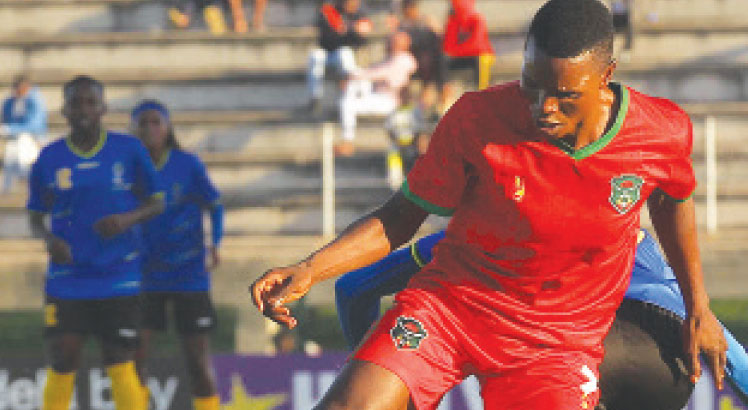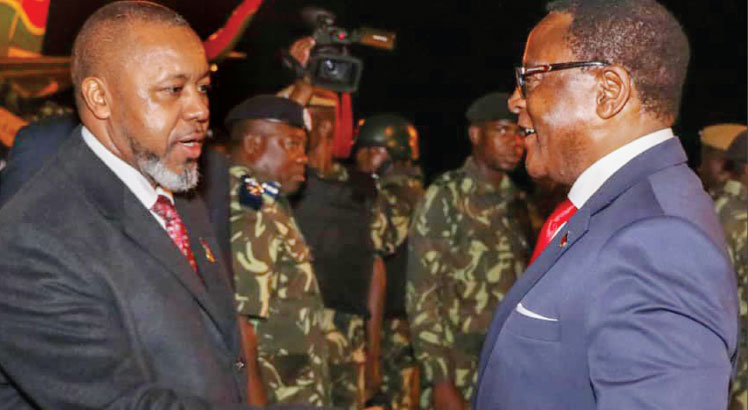Malawi Scorchers have been inactive for 10 months due to lack of funds despite Ministry of Sports and Football Association of Malawi (FAM) repeated assurances that they are committed to supporting women’s football.
The last time the Scorchers were in action was in August 2022 when they participated at the Cosafa Women’s Championship in South Africa.
Between August 2022 and June 2023, the Scorchers pulled out of several competitions including the Women’s Olympic Football Tournament Paris 2024 qualifiers.
The women’s junior national teams have not been spared as they also missed the Under-17 Afcon and Under-17 World Cup during that period.
Newly-elected National Women’s Football Association president Adellaide Migogo said the withdrawal from the tournaments is a lost opportunity.
Scorchers’ Asimenye Simwaka in action at last year’s Cosafa Women’s Championship
“We are just new in the office and are not privy to the Olympic Games programme. But I must say, this is a lost opportunity.
“Tabitha Chawinga has put the country on the map and opened doors for other girls. Scouts know that there is talent in Malawi.
“The only platform to expose our girls is through participation in international tournaments. We need to utilise these opportunities,” she said.
Chawinga, who recently became the first African to win the Serie A Golden Boot, described the failure to participate in tournaments as a big let-down.
She said: “This is a let-down to women’s football and the girls. It is through such tournaments that we get exposure to big teams in Europe or Asia.
“Big teams either send scouts or watch the games and that’s where the girls can market themselves. It really is a sad development.”
Chawinga called for more investment in women football from government to help grow the game in the country.
“Women football has potential to transform the lives of many girls in the country. I am an example of what football can do to transform a person’s life.
“It is my wish that many girls as possible get the opportunity. Government should take a deliberate attempt to invest in women soccer.”
FAM competitions and communications director Gomezgani Zakazaka attributed the women’s football national teams’ failure to participate in international competitions to lack of funds.
“We present a budget of over K1 billion to Malawi National Council of Sports every year, but we get much less than that.
“We get money in the range of K300 000 or K500 000 which is way below the budget.
“If the funding were approved as per our presentation, all national teams would be participating in the international activities,” he said.
Zakazaka said sometimes FAM has to sacrifice funds planned for developmental projects just to finance junior Flames and women’s football activities.
He said: “This is why FAM has been lobbying that national teams should have their own special vote in the national budget, rather than depending on Malawi National Council of Sports allocation which is shared among 48 associations.”
He further said the reason why the Flames may look like they are favoured is because they have a corporate sponsor.
On the Scorchers’ pulling out of the Olympic Qualifiers, Zakazaka said they decided not to participate because there was no funding from government after the association exhausted its allocation.
“To play the qualifiers’ first round, we needed about K150 million to buy air tickets and pay for accommodation and food,” he said.
Malawi National Sports Council spokesman Edgar Mtulumbwa said his organisation has made it a deliberate policy to fund only projects that have 50-50 gender component.
“As such, we cannot discriminate women in sports. The 50-50 gender balance is done deliberately to promote women. On women national football team funding, we release funds according to the budgets submitted to us by associations,” he said.
The post Rusty scorchers first appeared on The Nation Online.
 Moni Malawi
Moni Malawi 

